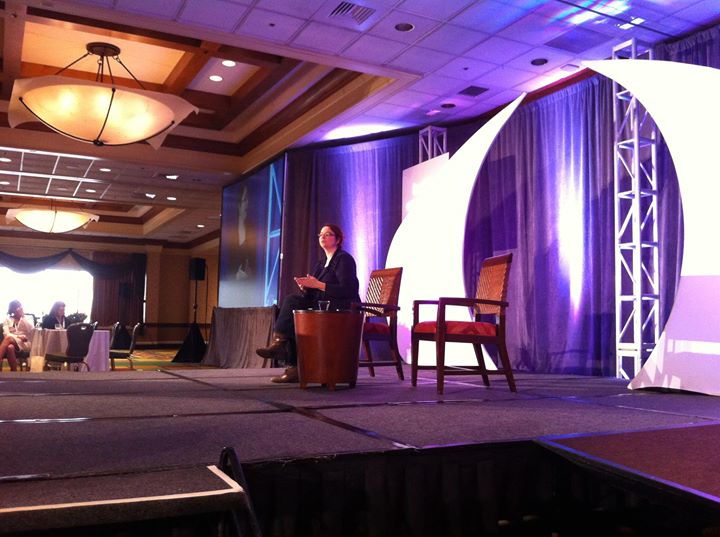
WITI, a leading professional organization for executive women in technology, is now in the middle of their Annual Women Powering Technology Summit. Jocelyn Goldfein, a director of engineering at Facebook, gave a talk this morning about the importance of getting more women into engineering, what the key obstacles are, and some changes that would make a difference in growing the number of women in tech.
Below is an excerpt from her talk:
“Our industry has a real problem: women are more than half the US population, about half of the US workforce – but hold less than a quarter of the jobs in science, technology, engineering, and math, aka the STEM fields.
You may have already known this, but in the last few years, women have come to outnumber men in terms of college degrees. Women earned 60% of bachelor’s degrees and over half of PhDs, numbers that have been climbing steadily for the last 20 years. But also in 2010, the number of women earning CS degrees was somewhere in the 15-18% territory, and that’s actually declined from the mid-eighties, when women earned about 37% of CS degrees.
So what? Why should we care?
It’s in our self-interests because technology helps the global economy in general, and the US economy in particular. The tech sector is leading this country’s economic recovery – companies like Facebook and Google can’t add engineers fast enough. And the US tech industry is importing talent from other countries – ten of thousands of workers every year – to feed that demand. Quite simply, our economy needs more technical talent, they are a competitive advantage for the US economy, and every person we add to the technical workforce makes us better off. Imagine how much better off we’d be if we weren’t missing out on nearly half the available talent pool.
So if the job market is so hot, and the jobs are so great – why aren’t there more women engineers?
I think implicit in asking us, is the question: Is tech a hostile environment, is there sexism? I can honestly say no, that has never been my experience. In my own experience, tech is actually a lot more meritocratic than a lot of other industries I’ve been exposed to.
The Truth about Stereotypes
So let’s talk about the elephant in the room. Maybe it’s just me, but perhaps some of you can relate: maybe, we think, the real reason there aren’t more women engineers is because women just aren’t as good at science and math. Maybe women are just hardwired to be more nurturing and less rational. Maybe the fact that I’m good at it is just evidence that I’m unfeminine, a tomboy, the exception that proves the rule.
Well, I’m here to forgive you for having those thoughts. There’s a lot of pseudo-science out there claiming to prove it, and it’s easy to have those thoughts because we’re surrounded by stereotypes that reinforce them.
Here’s the truth: Those stereotypes are themselves the main thing holding women back.
At this point, it’s well documented that most but not all of the difference in science and math performance between girls and boys can be explained by a difference in educational background. And we’re starting to see compelling evidence the remaining disparity comes from a phenomenon known as stereotype threat. Stereotype threat is the idea that the more you’re aware of negative stereotypes, the more likely you are to behave according to the stereotype.
In a simple study performed at Texas A&M, half the students taking a calculus test were given a statement that said that males and females perform equally well on this test. The other half were the control group – they had a completely normal test taking experience, no statement.
Even after normalizing for differences in background, the women in the control group still performed worse on the test than the men. That’s our gap, the one we expect. But the women who did read the statement, who were told explicitly that women and men did equally well on this test – they not only outperformed their female classmates who hadn’t read the statement, they actually did better than the men. Simply knowing that they weren’t expected to do worse had the effect of making these girls do better. And by the way – the statement had no effect on the men one way or the other, no one was penalized by these girls’ success.
So if this research is right, then girls perform less well in math and science pretty much because they know they’re supposed to do less well and that knowledge is a self-fulfilling prophecy.
It’s easy to see how this becomes a vicious spiral. Girls see stereotypes that guys are better at math and science, they do worse, they opt out, guys then dominate the advanced math and science classes, the stereotype is reinforced and so the cycle continues. So, to come full circle, the reason girls don’t go into computer science… is because girls don’t go into computer science.
So this is good news/bad news. The good news is: girls have just as much innate capability to be great scientists as boys.
The bad news: breaking out of vicious cycles is hard. It seems like it could require completely upending social norms for girls, and that’s a tall order.
Luckily, there are quite a few things we can do to make a difference today, even without sweeping reform.
Three Steps to More Women CS Majors
Let me tell you about a little college here in California called Harvey Mudd. In 2006, Mudd got a new president: Maria Klawe. When she arrived, Mudd’s computer science major was about 13% female, just a hair worse than the nationwide average. In less than 5 years, Klawe raised that number to over 42%. This is astounding.
Maria Klawe is pretty commonsense about what she did. Nothing magic, she says, nothing that other colleges couldn’t easily do as well. According to her, she made three simple changes:
First, she completely overhauled Mudd’s freshman level intro to CS course. They tracked experienced students apart from beginners, which according to Klawe made a big dent in the intimidation factor.
Second, she brings all her female students to the Grace Hopper conference. This makes a difference in part because they’re meeting role models, women they can identify with who’ve gone ahead of them. And it’s a lot of persuasive counter-evidence to those stereotypes.
Third, she gives her young women summer research opportunities after their freshman year, so they’re not just taught to program, they get to see how programming can be applied to solve problems and make a difference in the world. Teaching them not just what it is, but what it’s for. This armed them with the motivation to power through the obstacles they encountered.
These techniques work, and they can work for other colleges too.
Social Networking’s Impact
These days, computers are no longer for boys – if anything, moms and daughters are on the computer more than dads and sons. That’s because by far the dominant use of Americans’ time spent online these days is social networking. And the power users of these sites are women.
I’m a huge fan of the comic xkcd by Randall Munroe. This is one of my favorites, titled “how it works.”

There’s a lot of speculation out there, but here are the true facts about women on facebook. Women and men are on facebook in about the same numbers, representative of their demographics in the real world. But women users of facebook have, on average, 20% more friends, spend a third more time on facebook, play the most games, and create the majority of content: posts, photos, likes and comments, messages, you name it, women are ahead. Believe it or not, women are even responsible for most of the poking!
Now, this is great news for getting girls to identify with technology. But social is also the next big paradigm shift in the computing industry. Social is powering the next wave of successful startups. It’s redefining the future of software economic models. And women are the power users of it; and I have faith that this is going to help break down the stereotypes and inspire the young women who’ve grown up with Facebook to be at the forefront of defining these experiences for the next generation.
Share Your Stories
OK, so there are some macro trends in our favor, but I’d like to leave you all with some personal calls to action – things each of you can do to make a difference.
One thing we as women are getting systematically wrong is that we’re too shy about taking credit for our own accomplishments. We’re afraid of seeming arrogant and boastful. My female co-workers are some of the most impressively accomplished women engineers you could ever hope to meet. But to a woman, they are humble when it comes to talking about about what they’ve done.
So I’m going to brag a little on their behalf! Most of you probably had no idea that a woman engineer at facebook built the entire photo viewing experience we shipped in August. Built the UI of the new news feed. The search team at Facebook is led by a woman engineer, and a woman engineer made search 50% faster last year. Women engineers built sponsored stories so you can see less ad copy and more from your friends. Women have made facebook’s algorithms more intelligent about what content you want to see. They’ve built monitoring systems for our datacenters. The examples go on and on. These women are incredible, and what they’ve done is incredible! But getting these stories out of them is like pulling teeth.
Each one of you is probably sitting on an amazing story, a proud accomplishment thinking “Oh, I wouldn’t want to toot my own horn.” But when you tell that story, you aren’t fanning your own ego, you are serving as an inspiration to young women, to young people, real life evidence that stereotypes aren’t reality. Your story gives them someone to identify with, and something to aspire to in spite of the structural barriers in their way.
So to all the technical women out there: stand up! Own your success! Tell your stories and be a role model to young women and men just getting started. If you’re a parent, take your story to your kids, and to their school.
Finally, to all the young women in my audience: a few words of advice. First of all – take an intro to CS class, whether or not you think that’s what you might want to do with your life. It’s an important part of being literate in the 21st century. And you never know! You may really like it. Second, try a programming side project for fun, together with your friends. The myth of the lone hacker is just that: a myth. 99% of real world software development is done in teams, and designing and building something together is a big part of what makes it fun. Lastly – reach out to role models, whether women or men, who have gone ahead of you. Hearing the true stories of other people who love what they do is the best way to figure out what it is that you’re going to love doing.
So on that note, here’s my story: I feel extraordinarily lucky to be where I am. I lead a largepart of Facebook’s engineering team. My engineers build some of the most heavily used software products that have ever existed, like the facebook home page and facebook photos. My colleagues, male and female, are some of the smartest, most idealistic people I’ve ever worked with. I enjoy the rewards of building features used by my friends and family, not to mention hundreds of millions of others around the world. And I’m pretty convinced that the software we’re making is changing the world for the better, making us more connected, more open, and even more tolerant of each other. And, I’m excited to think that one of the changes we’re spearheading is change that means fewer and fewer women engineers will ever be the only woman in the room.”
Watch the video here.
As a Director of Engineering, Jocelyn helps manage the engineering team and oversees new product design and architecture. Presently she is focused on Facebook News Feed and Facebook Search. Prior to joining Facebook, Jocelyn was Vice President of R&D at VMware, where she managed the engineering and product teams for VMware’s desktop products. She previously was Director of Engineering at e-mail management start-up MessageOne. Jocelyn holds a bachelors degree in computer science from Stanford University.











